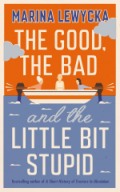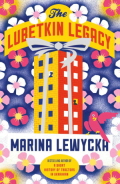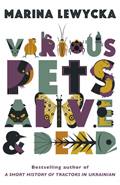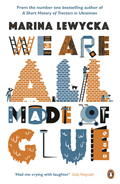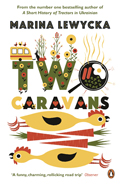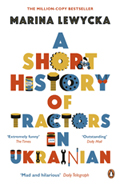![]()
BUCHER Magazine (Germany 2007)
Questions to Marina Lewycka:
![]()
Bucher![]() Since when do you write? Was there a certain moment, a situation that made you realize: I want to be an author?
Since when do you write? Was there a certain moment, a situation that made you realize: I want to be an author?
ML![]() I've been writing since I was a young child - almost since I learnt to hold a pen. In fact I think I was
making up poems and plays for my dolls even before I could write. I've always loved making up stories - I suppose I was a child who had a rich
fantasy life and a strong imagination. Maybe that's because I spent a lot of time playing on my own - I didn't have many friends, so I had to
invent friends, and turn my dolls into real people.
I've been writing since I was a young child - almost since I learnt to hold a pen. In fact I think I was
making up poems and plays for my dolls even before I could write. I've always loved making up stories - I suppose I was a child who had a rich
fantasy life and a strong imagination. Maybe that's because I spent a lot of time playing on my own - I didn't have many friends, so I had to
invent friends, and turn my dolls into real people.
Bucher![]() Your literary debut came relatively late. What did you do before this literary breakthrough?
Your literary debut came relatively late. What did you do before this literary breakthrough?
ML![]() I've worked as a teacher for most of my life, both in schools and colleges, and , more recently, in a
university where I've been teaching journalism and public relations. I do enjoy teaching very much, and that is one thing I miss in my present
work I enjoy the contact with young people and their enthusiasm for life. I have also taught many adult education classes, and a few years ago I
became an adult learner myself when I signed on for a course in creative writing at the university where I work. It was through this course
that I met my agent, who finally set me on the road to being a published author after all these years.
I've worked as a teacher for most of my life, both in schools and colleges, and , more recently, in a
university where I've been teaching journalism and public relations. I do enjoy teaching very much, and that is one thing I miss in my present
work I enjoy the contact with young people and their enthusiasm for life. I have also taught many adult education classes, and a few years ago I
became an adult learner myself when I signed on for a course in creative writing at the university where I work. It was through this course
that I met my agent, who finally set me on the road to being a published author after all these years.
Bucher![]() Publishers rejected your first book 36 times. But you did not resign. What gave you the strength
to keep on writing?
Publishers rejected your first book 36 times. But you did not resign. What gave you the strength
to keep on writing?
ML![]() I think most writers write because it is really a compulsion - to set things down; to capture reality
in words. After so many years of rejection, I did give up on fiction for a while, and I wrote a number of non-fiction books about care of the
eldely. But all the time, a voice inside my head was saying 'write another novel'. I think if this one had failed, though, I would not have tried again.
I think most writers write because it is really a compulsion - to set things down; to capture reality
in words. After so many years of rejection, I did give up on fiction for a while, and I wrote a number of non-fiction books about care of the
eldely. But all the time, a voice inside my head was saying 'write another novel'. I think if this one had failed, though, I would not have tried again.
Bucher![]() Since "A Short History of Tractors in Ukrainian" much things happened in your life. How did success change your life
(positive or negative, please give an example)?
Since "A Short History of Tractors in Ukrainian" much things happened in your life. How did success change your life
(positive or negative, please give an example)?
ML![]() The success of my novel has made many wonderful changes in my life - I can give up my teaching job and spend most of my time doing the thing I really love.
I travel the world and meet people I have always admired. I can even afford a new kitchen.
The success of my novel has made many wonderful changes in my life - I can give up my teaching job and spend most of my time doing the thing I really love.
I travel the world and meet people I have always admired. I can even afford a new kitchen.
But there have been negatives, too. I often feel guilty about neglecting my family and friends, and I have a great fear of becoming arrogant and selfish - it's so easy to think that you are someone really special, and I have to keep on reminding myself that a lot of my success has been due to luck.
The worst thing is I am always being invited to go to places and to take part in events - and at my age, I just feel I want to say 'yes' to everything. Then I find I have made too many commitments, and I start to panic. I have more pressures on me than I have ever had in my life before. Sometimes it's easy to think I could just spend my whole life going to festivals and parties, and forget about all those boring hours with the laptop.
Bucher![]() Which claim did you have on your second book? Did you feel a pressure to succeed? If yes,
what did you do against this feeling?
Which claim did you have on your second book? Did you feel a pressure to succeed? If yes,
what did you do against this feeling?
ML![]() Following A Short History of Tractors in Ukrainian was very difficult, because a part of me just wanted to
carry on writing the same book with the same characters. But another part of me thought - I want to explore my capabilities. I'll try to write
something completely different. The pressure to write comes not from without but from within. Because I started to write so late in life, I feel
I have limited time in which to achieve my potential as a writer, so I feel a great urgency to try out new techniques and styles, and to tell
all the stories that need to be told.
Following A Short History of Tractors in Ukrainian was very difficult, because a part of me just wanted to
carry on writing the same book with the same characters. But another part of me thought - I want to explore my capabilities. I'll try to write
something completely different. The pressure to write comes not from without but from within. Because I started to write so late in life, I feel
I have limited time in which to achieve my potential as a writer, so I feel a great urgency to try out new techniques and styles, and to tell
all the stories that need to be told.
Bucher![]() Your book is dedicated to the shell seekers of Morecombe. What story is behind this dedication?
Your book is dedicated to the shell seekers of Morecombe. What story is behind this dedication?
ML![]() Morecambe bay is a wide shallow beach in the north of England, and when the tide goes out, it is rich in
shell-fish which are a very popular food up here. But picking cockles is dirty, cold, tiring, poorly paid, and dangerous work, so it is often
done by immigrants. At Morecambe Bay, a group of twenty-three Chinese cockle pickers were swept away and drowned by the incoming tide. They did
not speak enough English to explain their predicament to the coastguard, and nobody was looking after their welfare. It shows that poor people
can pay with their lives for the privilege of working. I think many people in Britain were deeply shocked by this story.
Morecambe bay is a wide shallow beach in the north of England, and when the tide goes out, it is rich in
shell-fish which are a very popular food up here. But picking cockles is dirty, cold, tiring, poorly paid, and dangerous work, so it is often
done by immigrants. At Morecambe Bay, a group of twenty-three Chinese cockle pickers were swept away and drowned by the incoming tide. They did
not speak enough English to explain their predicament to the coastguard, and nobody was looking after their welfare. It shows that poor people
can pay with their lives for the privilege of working. I think many people in Britain were deeply shocked by this story.
In my creative writing class a number of the students wrote poems about it, and I knew that I too wanted to express my feelings about this tragedy. I wanted to pay tribute to the workers who come to Britain from all over the world, whose work we rely on to provide our high standard of living, but who remain anonymous until something like this happens.
Bucher![]() Later you grew up in England. Which picture, smell or thought comes into your mind when thinking of your first time in England?
Later you grew up in England. Which picture, smell or thought comes into your mind when thinking of your first time in England?
ML![]() I was very young when I came to England - about a year old. I can't remember very much at all; my earliest memory is of a
refugee camp in Surrey - I have a fleeting memory of sunlight on grass, walking up a lane holding my mother's hand.
I was very young when I came to England - about a year old. I can't remember very much at all; my earliest memory is of a
refugee camp in Surrey - I have a fleeting memory of sunlight on grass, walking up a lane holding my mother's hand.
Bucher![]() Now you live in Sheffield. Are there strawberry fields? Where did you research for "Two Caravans"?
Now you live in Sheffield. Are there strawberry fields? Where did you research for "Two Caravans"?
ML![]() Sheffield is in Yorkshire, in an area famous for steel and coal, so there are not many strawberry fields around
here. The book is set in the county of Kent, in the south. It is a place I have visited often in the last few years because of family connections,
and I have met many fruit pickers from Eastern Europe on the local train, and got into conversation with them. They are always surprised when I
speak to them in Ukrainian or Russian, but they are happy to share their experiences with me.
Sheffield is in Yorkshire, in an area famous for steel and coal, so there are not many strawberry fields around
here. The book is set in the county of Kent, in the south. It is a place I have visited often in the last few years because of family connections,
and I have met many fruit pickers from Eastern Europe on the local train, and got into conversation with them. They are always surprised when I
speak to them in Ukrainian or Russian, but they are happy to share their experiences with me.
Bucher![]() What about Marina Lewyckas next book? Will we meet Ukrainians once again?
What about Marina Lewyckas next book? Will we meet Ukrainians once again?
ML![]() I can say categorically that my new book has no Ukrainian characters, and no vehicles.
I can say categorically that my new book has no Ukrainian characters, and no vehicles.
Bucher![]() What is the most special or fascinating characteristic of the Ukrainians?
What is the most special or fascinating characteristic of the Ukrainians?
ML![]() Ukrainians love to argue and complain, and to blame someone else for anything that goes wrong. I guess
this makes them typical human beings. But the are also very warm hearted, intelligent and resourceful people - they need to be, to survive the
terrible trials that history has thrown at them.
Ukrainians love to argue and complain, and to blame someone else for anything that goes wrong. I guess
this makes them typical human beings. But the are also very warm hearted, intelligent and resourceful people - they need to be, to survive the
terrible trials that history has thrown at them.
Bucher![]() How did you create the characters of this book (maybe real examples?)?
How did you create the characters of this book (maybe real examples?)?
ML![]() All the characters in Two Caravans are based on people I have met. The Ukrainians are based on people I
met on my recent visit to the country, and in particular I have tried to express the conflict beween the westward-looking west of the country,
and the regions to the east, where people still feel very close to Russia, and speak the Russian language. The Poles are modelled on people I
have met here in England - we have many Polish workers here today, mostly very educated people doing jobs well below their capabilities. The
Chinese girls are based on some of my former students; my daughter works in Malawi, and on my visits to that wonderful country, I have met
young men very like Emanuel. Even Dog is based on a real dog, who lives near Sheffield, and has taken me walking in the Derbyshire hills on
many occasions. Like the dog in the book, he has a mystery. He arrived late one night, covered with cuts and scratches, and attached himself to
my friends and refused to leave. It was clear that he was running away from something - but what? We spent hours trying to imagine, and make up
stories for him - because of course he could never tell us.
All the characters in Two Caravans are based on people I have met. The Ukrainians are based on people I
met on my recent visit to the country, and in particular I have tried to express the conflict beween the westward-looking west of the country,
and the regions to the east, where people still feel very close to Russia, and speak the Russian language. The Poles are modelled on people I
have met here in England - we have many Polish workers here today, mostly very educated people doing jobs well below their capabilities. The
Chinese girls are based on some of my former students; my daughter works in Malawi, and on my visits to that wonderful country, I have met
young men very like Emanuel. Even Dog is based on a real dog, who lives near Sheffield, and has taken me walking in the Derbyshire hills on
many occasions. Like the dog in the book, he has a mystery. He arrived late one night, covered with cuts and scratches, and attached himself to
my friends and refused to leave. It was clear that he was running away from something - but what? We spent hours trying to imagine, and make up
stories for him - because of course he could never tell us.
Bucher![]() "A Short History of Tractors in Ukrainian" was not published in the Ukraine. Will "Two Caravans" be
published there?
"A Short History of Tractors in Ukrainian" was not published in the Ukraine. Will "Two Caravans" be
published there?
ML![]() I was disappointed that A Short History of Tractors in Ukrainian was not published in Ukraine, and I
hope very much that Two Caravans will be. It is being translated at the moment, so I am very optimistic.
I was disappointed that A Short History of Tractors in Ukrainian was not published in Ukraine, and I
hope very much that Two Caravans will be. It is being translated at the moment, so I am very optimistic.
Bucher![]() When have you been in the Ukraine for the first time? What was the most beautiful or funniest experience there?
When have you been in the Ukraine for the first time? What was the most beautiful or funniest experience there?
ML![]() When I was researching 'A Short History of Tractors in Ukrainian', I came across a Russian family-search website,
for families like mine who had lost contact during the war. I typed in my surname and my mother's maiden name, sent it off, and forgot about it.
When I was researching 'A Short History of Tractors in Ukrainian', I came across a Russian family-search website,
for families like mine who had lost contact during the war. I typed in my surname and my mother's maiden name, sent it off, and forgot about it.
It wasn't until a whole year later, when the book was well on its way to publication, that I found three mysterious letters in Cyrillic script in my email inbox, saying 'Hello Marina! We are your long lost relatives! I had forgotten all about the family search website. I thought this must be one of those internet scams where I would be asked to send huge sums of money to these putative relatives. But, just in case, I replied, with a couple of 'trick' questions, that only real relatives would know the answer to.
The letters that came back brought tears to my eyes. Not only did they answer the questions, but they sent a whole family tree. And there were photographs - they must have scanned them in - of my grandparents whom I had never met, of aunts, uncles, cousins - there are dozens of them over there! Photos of my parents as children and later as young adults. How familiar and yet how different they looked, in their quaint 1930s-style clothes, their faces unlined, and laughing as though they had no idea what life would throw at them.
And alongside all the old sepia photographs, some colour snaps of my new Ukrainian family: my cousin Marina, who is the daughter of my father's sister, now in her sixties and living in Moscow with her daughter and grandchildren. And my cousin Yuriy with his mother Oksana, who is aged 86 and still living in Luhansk. Oksana is my mother's sister; they hadn't seen each other since 1943. This summer, my daughter and I went over to visit them.
Before my mother died, I sat down and made a tape with her about her life and her journay from Ukraine via Germany into England; I was thinking - one day I will write a novel about this. The novel I wrote in the end, contained part of that story; but I kept the tape, and I was able to give it to my mother's suster, when I met her in Lugansk in 2005. They had not seen each other for 62 years, but my aunt was able to listen to her sister, speaking in her own langiage, describing everything that had happened to her since they had parted. It brought tears to her eyes - and to my eyes, too.
Bucher![]() Your new book seems to be a kind of social satire. Is there some criticism behind?
Your new book seems to be a kind of social satire. Is there some criticism behind?
ML![]() In Two Caravans I have set out to write a story about the human faces behind the immigration
statistics which our newspapers are full of. Of course there is an element of satire, but I hope there is also love, adventure, and plenty of humour.
In Two Caravans I have set out to write a story about the human faces behind the immigration
statistics which our newspapers are full of. Of course there is an element of satire, but I hope there is also love, adventure, and plenty of humour.
Bucher![]() You are writing so much about Ukrainians. Do you have many Ukrainian friends?
You are writing so much about Ukrainians. Do you have many Ukrainian friends?
ML![]() I know very few Ukrainians of my generation in England. Most people I know are of my parents generation
and very old. But it is always delightful to meet the new generation of Ukrainian migrants and surprise them by talking to them in Ukrainian ,
when of course I seem very English to them.
I know very few Ukrainians of my generation in England. Most people I know are of my parents generation
and very old. But it is always delightful to meet the new generation of Ukrainian migrants and surprise them by talking to them in Ukrainian ,
when of course I seem very English to them.
Bucher![]() You also write about Ukrainian stereotypes - what are the classical ones?
You also write about Ukrainian stereotypes - what are the classical ones?
ML![]() I'm not sure about this - some people say that Valentina is a 'stereotype', but I have never read
about anyone quite like her in any other books, and in fact the character in my book is partly modelled on the American fortune-seeker
Anna Nicole Smith. Even if she is a stereotype, I think she is universal, not just specific to Ukraine.
I'm not sure about this - some people say that Valentina is a 'stereotype', but I have never read
about anyone quite like her in any other books, and in fact the character in my book is partly modelled on the American fortune-seeker
Anna Nicole Smith. Even if she is a stereotype, I think she is universal, not just specific to Ukraine.
Bucher![]() Please complete the sentence. A life without writing, would be...
Please complete the sentence. A life without writing, would be...
ML![]() ...like porridge without honey - wholesome but tasteless.
...like porridge without honey - wholesome but tasteless.
Bucher![]() Do you have a favourite place for writing? And how does it look like?
Do you have a favourite place for writing? And how does it look like?
ML![]() I like to write in bed, in the mornings. As soon as I wake up, at about six o'clock,
my head is buzzing with ideas, and I try to get as much writing done as I can, before the chores and distractions of the day set in.
I like to write in bed, in the mornings. As soon as I wake up, at about six o'clock,
my head is buzzing with ideas, and I try to get as much writing done as I can, before the chores and distractions of the day set in.
Bucher![]() Do you have a certain ritual?
Do you have a certain ritual?
ML![]() I usually have my breakfast in bed on a tray while I'm writing - oatmeal porridge with honey,
and a big pot of tea. If I'm lucky, my husband brings it up to me.
I usually have my breakfast in bed on a tray while I'm writing - oatmeal porridge with honey,
and a big pot of tea. If I'm lucky, my husband brings it up to me.
Bucher![]() How does your workplace look like? What hangs on the wall, how does your chair look like etc?
How does your workplace look like? What hangs on the wall, how does your chair look like etc?
ML![]() As my workplace is my bedroom, it is usually full of clutter - I'm not very good at hanging up my clothes
the night before, so this is the thing you would notice on the floor if you walked in. I collect old watercolour paintings, and there are a
number of these on the walls - two of them are of old boats, one is an old line drawing of Whitby, where we often used to go away on holiday.
They don't have great artistic merit, but I like the fact that they are original - that someone a bit like me sat down in front of the page
and composed them. I feel very close to those anonymous artists when I look at them while I am working.
As my workplace is my bedroom, it is usually full of clutter - I'm not very good at hanging up my clothes
the night before, so this is the thing you would notice on the floor if you walked in. I collect old watercolour paintings, and there are a
number of these on the walls - two of them are of old boats, one is an old line drawing of Whitby, where we often used to go away on holiday.
They don't have great artistic merit, but I like the fact that they are original - that someone a bit like me sat down in front of the page
and composed them. I feel very close to those anonymous artists when I look at them while I am working.
Bucher![]() What was your career aspiration as a child?
What was your career aspiration as a child?
ML![]() If I hadn't become a teacher, I would have liked very much to be a doctor. I have quite a scientific brain.
But being a writer is the best career of all - I dreamed of it, but never thought I could achieve it.
If I hadn't become a teacher, I would have liked very much to be a doctor. I have quite a scientific brain.
But being a writer is the best career of all - I dreamed of it, but never thought I could achieve it.
Bucher![]() What was the topic of your first text? When did you write it?
What was the topic of your first text? When did you write it?
ML![]() The first thing I can remember writing is when I was four years old. It's a poem, and it goes like this:p
The first thing I can remember writing is when I was four years old. It's a poem, and it goes like this:p
Green grass, green grass,
One little rabbit hopping past,
Two little butterflies flying by,
Three little skylarks up in the sky.
Four little lambs are playing there below.
Five little men are walking to and fro.
Six little girls are merrily at play.
Oh isn't it a pleasant and a sunny summer's day.
I have no idea where the ideas came from - they are not very profound - but you can see that I already had a great love of sound and rhythm, which has stayed with me all my life.
![]()
<< This Writing Life page one | This Writing Life page two
![]()

